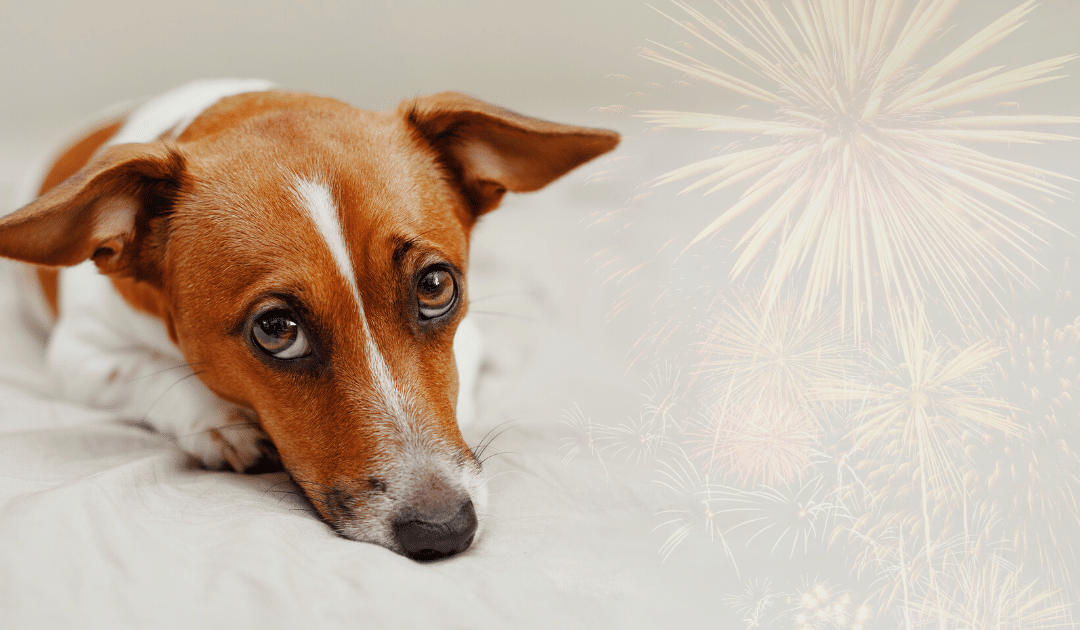It’s that time of year again — time to light up the grill, gather family and friends and celebrate American Independence. If yours, your neighborhood’s or your city’s plans include fireworks, then there’s one group that won’t necessarily be in a celebratory mood: household pets.
Every year, July 5th is the busiest day at animal shelters across the country. They receive an influx of dogs and cats who fled their homes the night before, trying to escape the sound and explosions of fireworks. When scared and pumping adrenaline, pets can scale high fences and break loose from leashes and chains.
If your pet is scared of loud noises, take these precautions to ensure that they stay safe and sound this July 4th.
Before the Holiday
-
- If your pet is especially nervous, consult your veterinarian about tranquilizers or drugs that can help with anxiety. Talk with them about giving a “practice” dose of medication before the event to see how your pet responds.
- Work with an animal behaviorist or trainer. For some pets, positive reinforcement and behavior modification training around their fears can make all the difference.
- Make sure your pets’ ID tags are updated with your current contact information and that tags are securely affixed to their collar.
- Update their microchip registration and pet license information. If they aren’t yet chipped, this is a good opportunity to do so.
On July 4th
-
- Move them to a room and put on soothing music. Cover windows to minimize the sound and flashes of light.
- An anxiety vest — or even a snugly fitting t-shirt — could help calm them.
- If they are especially anxious, make sure someone checks in on them frequently. That person should act calm and reassuring — animals look to their humans to gauge danger.
- Noise anxiety is not as common with cats as it is with dogs, but it can happen. Cats tend to hide (very well) when scared, so make sure you check in on them too. Keeping them indoors (and in a room of their own) is a good idea.
- If for any reason your pet is outside during fireworks, keep them away from any lit fireworks, which can result in burns to the face, nose, lips, eyes, or inside of the mouth.
After the Festivities
Whether or not you ignited fireworks on your property, search your front and back yards for unignited fireworks or spent remnants. Remember that some may have landed in your yard from neighbors. Immediately remove any you find — fireworks contain many chemicals and heavy metals that are toxic to animals. Do a second cleaning sweep in the morning before letting animals access your yards.
If you’re not sure if your pet may have been exposed to or ingested fireworks — lit or unlit — watch for the following signs, which vary depending on the type and amount ingested. Contact your vet immediately.
-
- Abdominal Pain
- Vomiting
- Bloody diarrhea
- Seizures
- Tremors
- Shallow breathing
- Jaundice
- Acute kidney failure
Having a game plan to keep your pets safe during the holiday ensures that you won’t spend July 5th searching the streets and shelters. If your dog or cat could talk, they’d thank you for it.
This article is furnished by California Casualty, providing auto and home insurance to educators, law enforcement officers, firefighters, and nurses. Get a quote at 1.866.704.8614 or www.calcas.com.
- Graduation – When to Remove Your Child from Your Auto Policy - May 18, 2023
- How to Prevent Catalytic Converter Theft - May 17, 2023
- How Much Does Home Insurance Cost? - May 17, 2023

